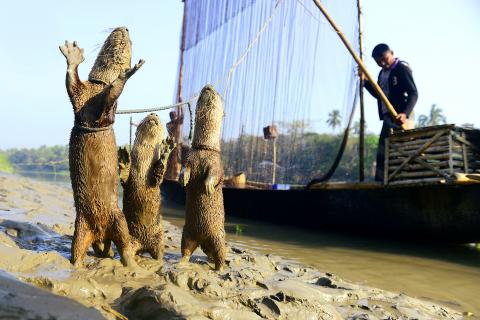Swimming in circles alongside a fishing boat, two short-haired otters speed across a river in southern Bangladesh that feeds into the Sundarbans, the world’s largest mangrove forest.
The fishermen lower a net close to the riverbanks and the animals splash into the water.
The rare technique relies on coordination between man and trained otters, a centuries-old partnership that has already died out in other parts of Asia.

Photo: AFP
“Our job depends on the otters,” says Shashudhar Biswas, a fisherman in his 50s, whose family has trained the animals for generations. The otters do not catch the fish, but instead chase them toward the net next to the boat.
“The otters manage to spot fish among the plants, then the fish swim away and we stay close with our nets. If we did it without them, we wouldn’t be able to catch as many fish,” says Shashudhar’s son Vipul, standing as he steers the boat along the leafy canal.
Fishing is usually done during the night when the fishermen can expect to catch between four and 12kg of fish, shrimp and crabs.
The family earns around US$250 a month selling their catch at the local market.
However, in recent years, once-abundant fish are increasingly scarce and the nets dragged up are often empty.
“The kinds of fish we used to find with our father, we don’t see here anymore,” says Vipul.
Natural fish populations have crashed in recent years, says Mohammed Mostafa Feeroz, a zoology professor at Dhaka’s Jahangirnagar University, because “the fish simply cannot breed.”
“Over-sedimentation, water pollution from oil and the use of pesticides in [rice] paddy fields, as well as over-catching are all having an impact,” Feeroz said.
Feeroz has been studying otter fishing in Bangladesh for 25 years. Over this period the number of families involved has dropped from 500 to 150.
“Go back 50 years, and the practice has declined by about 90 percent,” he says.
If the trend continues, he believes otter fishing will be “completely wiped out” within the next two decades.
Though still in his 20s, Vipul is equally pessimistic.
“If there are no fish, then there’s no point in having the otter-fishing system,” he says.
“Just look at my family’s situation. My brothers and sisters, they all want to study. They don’t want to get into the river and catch fish. If they study, then they will obviously move out of the village to find better jobs, or they will buy fish from the wholesaler and sell them,” he adds.
He worries that his only source of income will soon no longer be profitable.
Each month almost half of his earnings are spent on feeding his five otters — two fully trained adults and three young apprentices — who eat 3 to 4kg of fish a day.
Wildlife experts fear it is not only the livelihoods of the fishing families that are under threat.
Short-haired otters are an endangered species in Bangladesh; otter fishing plays a key role in their conservation, Feeroz says.
“The captive population here is very healthy because of the fishing,” he says.
Sometimes fishermen release otters into the wild, which strengthens that population, research shows.
“However, as the practice gradually decreases, the wild population will face increased pressure,” he adds.

Four people jailed in the landmark Hong Kong national security trial of "47 democrats" accused of conspiracy to commit subversion were freed today after more than four years behind bars, the second group to be released in a month. Among those freed was long-time political and LGBTQ activist Jimmy Sham (岑子杰), who also led one of Hong Kong’s largest pro-democracy groups, the Civil Human Rights Front, which disbanded in 2021. "Let me spend some time with my family," Sham said after arriving at his home in the Kowloon district of Jordan. "I don’t know how to plan ahead because, to me, it feels

Polish presidential candidates offered different visions of Poland and its relations with Ukraine in a televised debate ahead of next week’s run-off, which remains on a knife-edge. During a head-to-head debate lasting two hours, centrist Warsaw Mayor Rafal Trzaskowski, from Polish Prime Minister Donald Tusk’s governing pro-European coalition, faced the Eurosceptic historian Karol Nawrocki, backed by the right-wing populist Law and Justice party (PiS). The two candidates, who qualified for the second round after coming in the top two places in the first vote on Sunday last week, clashed over Poland’s relations with Ukraine, EU policy and the track records of their

‘A THREAT’: Guyanese President Irfan Ali called on Venezuela to follow international court rulings over the region, whose border Guyana says was ratified back in 1899 Misael Zapara said he would vote in Venezuela’s first elections yesterday for the territory of Essequibo, despite living more than 100km away from the oil-rich Guyana-administered region. Both countries lay claim to Essequibo, which makes up two-thirds of Guyana’s territory and is home to 125,000 of its 800,000 citizens. Guyana has administered the region for decades. The centuries-old dispute has intensified since ExxonMobil discovered massive offshore oil deposits a decade ago, giving Guyana the largest crude oil reserves per capita in the world. Venezuela would elect a governor, eight National Assembly deputies and regional councilors in a newly created constituency for the 160,000

North Korea has detained another official over last week’s failed launch of a warship, which damaged the naval destroyer, state media reported yesterday. Pyongyang announced “a serious accident” at Wednesday last week’s launch ceremony, which crushed sections of the bottom of the new destroyer. North Korean leader Kim Jong-un called the mishap a “criminal act caused by absolute carelessness.” Ri Hyong-son, vice department director of the Munitions Industry Department of the Party Central Committee, was summoned and detained on Sunday, the Korean Central News Agency (KCNA) reported. He was “greatly responsible for the occurrence of the serious accident,” it said. Ri is the fourth person